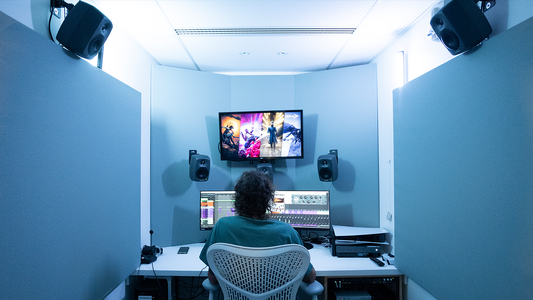So many great posts exist on the business of finding work, the mechanics of songwriting, how to capture proper field recordings, middleware, etc. I wanted to contribute to a different aspect of game audio. One mentioned far less - usually in footnotes of articles about other things. I want to discuss the psychology of freelancing in game audio.
Below is an analysis of the intrinsic psychological experiences you’ll encounter as a freelancer in game audio. It’s general enough for all freelancers (looking right at you game devs and artists). But it’s specifically for us sound designers, composers, and audio implementers. It contains some tips and encouragement for mentally enduring this challenging lifestyle. It is my hope that you’ll see parallels between my experiences and your own. This may help illuminate certain changes you’d like to make in your own work habits.
ME
For the sake of transparency and to hopefully help give you perspective, I’ll share a bit of personal background info. I’m not a psychologist, at all. I graduated from Ohio State University with my Bachelors in Astronomy & Astrophysics. I’ve been officially working as a freelancer in the game industry for 2ish+ years - have had some successes, a few nominations and a lot of failures. The majority of my experience comes from the myriad of bands I’ve been in, produced, and recorded over the years. Mental health is a topic I’m intimately familiar with and I’d like to share what I’ve learned with you.
WHY?
The mental environment we embody as audio storytellers plays a tremendous role in shaping our habits. It deeply affects us as individuals, which impacts how we interact with others. This alone warrants a deeper understanding of how our brains work. But understanding it helps us avoid the various blackholes we create for ourselves. Knowing a bit about the mind goes a long way toward sustaining a fruitful career in freelance.
KNOW THYSELF
First things first, I recommend taking a Myers-Briggs test. This one is free, insightful, and very-much in line with Carl Jung’s original theories and ideas. The man was eerily correct about many things. In a nutshell, the Myers-Briggs test is designed to inform you of your specific psychological preferences. In more meta terms, it is a description of the tendencies with which you construct your own reality. Be honest with yourself when answering the questions, there are no wrong answers.
You’ll be informed of your inclinations in various aspects of life. Romantic relationships, friendships, career, work habits, parenthood, etc. Knowing your tendencies can do wonders for your state of mind. It will in turn have a positive affect on you as a person, which in turn will affect those around you.

Above is a simplified version of the Schachter-Singer theory of emotion. Extrapolating from it, the important take away is this: events do not affect your mood, it is your perception of events that affect your mood. If your perceptions are distorted, your emotional responses will be inaccurate. Negative moods simply reveal that you are thinking something negative AND believing it. This is actually good news because it means if you develop the skills to regulate your perceptions (which you CAN do), you will better manage your emotions.
Developing an awareness of your tendencies will serve you well when encountering road blocks. Difficulty finding work, frustration when your skill level doesn’t match your taste, lack of consistent income, unhelpful feedback, project cancellations, knowledge gaps, etcetera. Recognizing your habitual reactions in these scenarios is a first step toward viewing the world honestly and regulating your emotions accordingly. You'll develop a much-needed resilience to endure this line of work.
FREE YOUR MIND
When you know how to listen, everyone is the guru
- Ram Dass
You can learn from anyone - you can ignore 99% of what they say and still learn something insightful. This is also great to keep in mind when dealing with rejection, or creative criticism. Remembering that your perceptions may be distorted or incomplete makes it a lot easier to hear critical feedback. And since you’ve legally agreed (you signed a contract right?) to work for a project, not solely for yourself, but for a project, you have to remember that it’s not necessarily about you or your vision, it’s about the project itself. You are simply part of something bigger.
For the first 12ish years of writing my own songs, I look back and cringe at how over-protective I was of every single note. I had a hard time actually hearing feedback from people, even those I trusted with constructive things to say. Because I was so emotionally involved in that music, everything felt personal and it was heart-breaking to hear the tiniest little suggestion. It held me back and certainly convinced others that I was too sensitive and difficult to work with. One of the ways I improved on this was simple: I wrote more music. The more you create, the less precious you feel toward your work and the more receptive you’ll be toward valuable feedback.
Write with the door closed, rewrite with the door open
- Stephen King
I have since completely adopted every aspect of this great piece of advice in my work habits. Typically, I begin writing music mostly from a place of inspiration. I work on it, mold it, and when it comes time to editing, I seek out every piece of feedback I can from fresh ears. Then I go at whatever I’ve written ruthlessly with a sledgehammer. I usually spend more time erasing notes than adding them. This approach has helped me sidestep many of the personal insecurities that always come up in creative work.
AVOID SUPERFICIAL ADVICE
Even with the best intentions, certain advice can be critically damaging when you’re starting out. Plenty of books written by knowledgeable authors offer valuable insight - not all of it is relevant to you or your situation. What worked for them is what they tend to recommend to others. How you interpret the information presented in these sources is paramount, because you will be constructing long-term goals based on this information. You want your thoughts to be as clear and undistorted as possible. Aren’t you glad you’re more familiar with your own tendencies now!
The habits of 'effective’ people (usually famous ones) is certainly an interesting topic, albeit a superficial one. From time to time I do enjoy reading about the routines of various people. But I caution you not to try and adapt their habits under the illusion that it worked for them, it'll work for me. I love Alexandre Desplat’s music. But if I (hypothetically) read somewhere that his favorite instrument was the saxophone, and that information was presented in a way that suggested if only you liked the saxophone more, maybe you’d be a great composer too, I’d ignore it. It’s just scientifically illiterate click-bait, and the internet is FLOODED with this kind of vague advice. His music and career aren’t great because he prefers particular instruments, there are a million factors why he has the life he does. Some of those factors apply to you, some of them don't. You will have to adapt/ignore information based on what’s right for your needs and goals. Behaviors of ‘effective’ people aren't better or worse than your own, they're just adaptations to different environments.
By the way, you should really establish your needs and goals as soon as possible. You need a beacon, something you can focus on through all the ups and downs you’ll experience. Write the specifics down somewhere, a notebook, Evernote, whatever, just keep it fresh in your mind and available.

ON STRESS




































